 |
|
E-News from State and Federal
Communications, Inc. |
December 2016
|
|
|
It is Going
to be a New Era in Compliance
One of the
most important facets of any professional in the
government relations field is knowing what you
can, and cannot do, regarding Political
Contributions, Lobbying, and Procurement
Lobbying. Making a compliance mistake can be
costly, in reputation, negative media exposure,
and fines.
The laws and
regulations in our field are continually
changing. And due to the recent presidential and
other elections, we expect many more changes to
come in 2017.
We are ready
for all of this at State and Federal
Communications. We are ready to help you!
That is why
we have re-branded our 2017 website guides as
the Online Compliance Publications for
Government Relations Professionals.
These four online publications are:
-
Political Contributions Compliance Laws for
Government Relations ProfessionalsTM
-
Lobbying
Compliance Laws for Government Relations
ProfessionalsTM
-
Procurement Lobbying Compliance Laws for
Government Relations ProfessionalsTM
-
Canadian
Compliance Laws for Government Relations
ProfessionalsTM
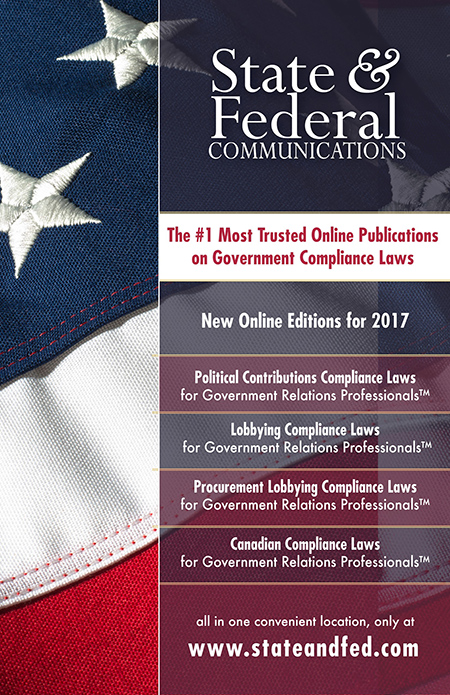 Note the
emphasis from each title, first on ‘what’
compliance area the online publication is
intended to serve, and second on our focused
audience, ‘Government Relations Professionals.’ Note the
emphasis from each title, first on ‘what’
compliance area the online publication is
intended to serve, and second on our focused
audience, ‘Government Relations Professionals.’
These unique
online publications are considered invaluable to
government relations professionals. They make it
easy to decipher and understand compliance
regulations, and to accurately report activities
to government entities as needed. They are
optimized to easily use and search on any device
– computer, laptop, tablet, or smart phone – and
updated continually so government relations
professionals can comply in a timely and
accurate manner.
This is an
annual subscription-based service, where you can
purchase one, two, three, or four online
publications, whatever you need, with special
bundled pricing available. They provide
accurate, comprehensive, and timely information
on thousands of compliance rules, regulations,
and statutes across the states, the U.S. federal
government, more than 600 municipalities, and
Canadian federal, provincial, and territorial
governments.
In the weeks
ahead, we will send our new 2017 brochure of
services, so look for it in the mail. You can also
read and download a PDF of the new brochure by
visiting our
website. Note, for
2017 we have updated subscription rates (first
time in four years), so for subscribers looking
to renew and capture 2016 pricing, consider
making the payment by the end of this year.
For the many
clients who have used our publications through
the years, we thank you for your loyalty, and
for the new clients that come onboard in 2017,
we look forward to serving you.
There is no
other company like State and Federal
Communications.
Thank you.
Elizabeth Z. Bartz
President and CEO
@elizabethbartz
 |
|
Coming January
2017
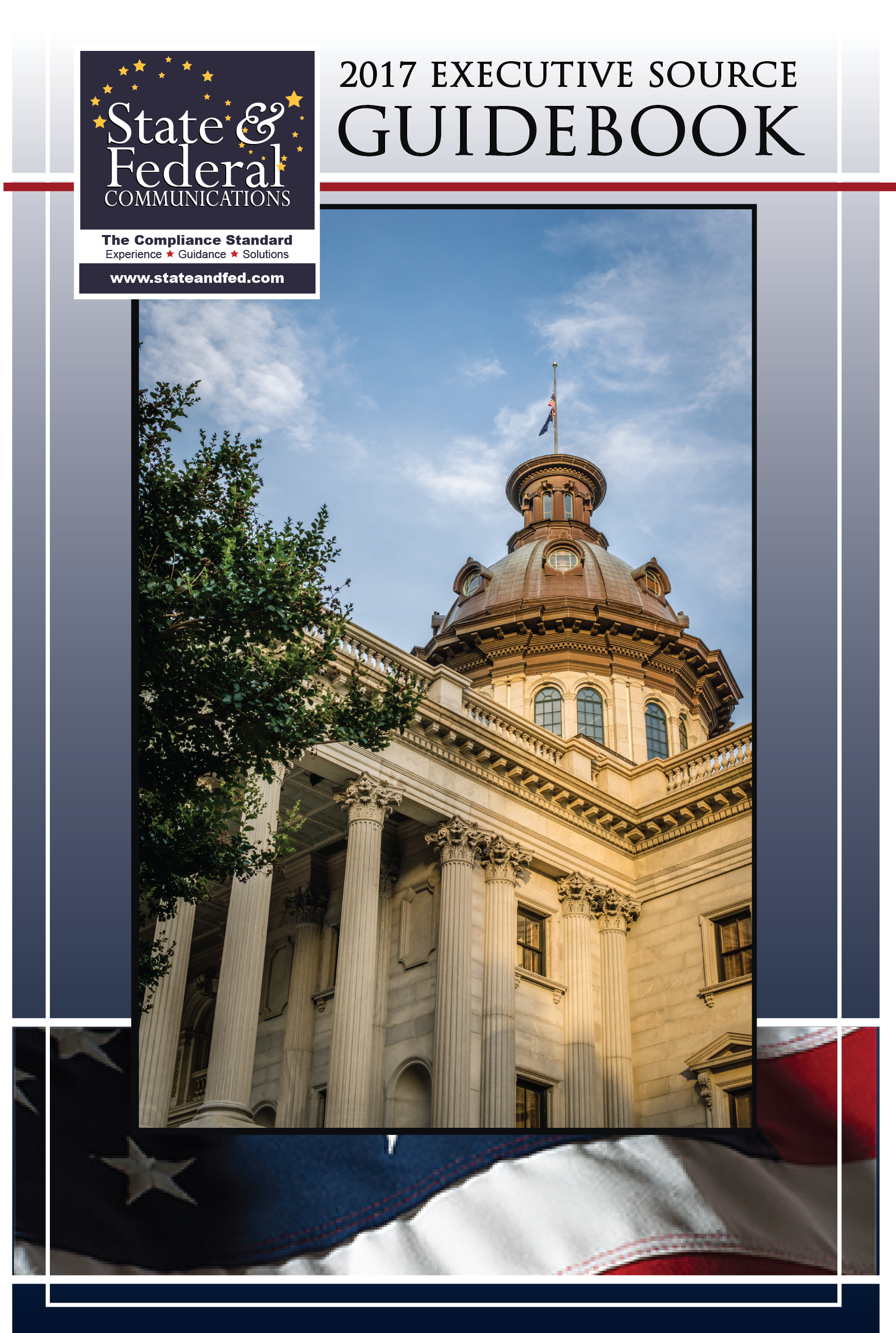 |
|
|
|
 
Missouri Voters Approve Campaign
Contribution Reform Initiative
Katlin Newman, J.D.,
Research Associate
On
November 8, Missouri voters approved dramatic changes to state
campaign finance laws. The Missouri Campaign Contribution Reform
Initiative (Constitutional Amendment 2) establishes contribution
limits, prohibits direct corporate contributions to candidates, and
creates questions for political action committees (PACs). The
amendment is effective December 8, 2016, 30 days following voter
approval.
The
amendment creates contribution limits for persons contributing to
political parties or committees to elect candidates for state or
judicial office. Contributions to statewide candidates and
committees will be limited to $2,600 per election. Contributions to
political parties will be capped at $25,000 in the aggregate per
election at the state, county, municipal, district, ward, and
township levels combined.
The
amendment also prohibits direct corporate and labor organization
contributions to candidates, campaign committees (short-term ballot
issue committees), exploratory committees, and political parties.
Corporations and labor organizations will be permitted to form PACs
to accept contributions or dues from members, officers, directors,
employees, or security holders. As written, the amendment places no
restrictions on a corporation seeking to use its funds to contribute
to a PAC.
While
corporate contributions to PACs will be permissible, PAC
contributions to other PACs will be prohibited. Implications of the
prohibition remain unclear for federal PACs participating in
Missouri elections. The amendment allows federal PACs to contribute
to in-state PACs, but also requires out-of-state committees
participating in Missouri elections to register and report with the
state. Currently, federal PACs in compliance with the Federal
Election Commission are not required to register with the state. The
Missouri Ethics Commission plans to issue further guidance because
the amendment allows a federal PAC to contribute to an in-state PAC
and requires a federal PAC to register as an in-state PAC, but
prohibits an in-state PAC from contributing to another in-state PAC.
The
Missouri Ethics Commission has expressed concerns regarding the
legality of certain provisions, but will enforce the amendment until
any or all of it is deemed unconstitutional. Whether in the form of
an advisory opinion, guide, or some other mechanism, the commission
will issue additional guidance to ensure a consistent interpretation
of the new law. |
|

 Summary of Changes UPDATE Summary of Changes UPDATE
Note Recent Changes to
Compliance Regulations
Michael Beckett, Esq., Research
Manager
CANADA: Lobbying Commissioner
Karen Shepherd will not seek reappointment when her current term
expires at the end of December. Shepherd has been the commissioner
since the creation of the position in 2008. The Governor in Council
will appoint a new commissioner after consulting with the leader of
every recognized party in the Senate and House of Commons. Following
the consultation, the Senate and House of Commons must approve the
appointment by resolution.
CHICAGO, ILLINOIS: The Chicago
Board of Ethics recently submitted two amendments to City Council,
potentially affecting lobbyist filing procedures. One amendment
would require lobbyists to file all documents electronically in the
Electronic Lobbyist Filing (ELF) system. The other amendment would
establish enforcement provisions related to the electronic filing
requirement. Unless a majority of aldermen vote to disapprove them,
the Board of Ethics will implement the changes beginning January 1,
2017. Paper filings will no longer be accepted after December 31,
2016.
RENO, NEVADA: City Council
adopted a new lobbying law for the city. The Registration and
Regulation of Lobbyists ordinance requires lobbyists to register
with the city clerk, to inform the city of their clients, and to
wear lobbyist badges when in City Hall. The ordinance also includes
civil and criminal penalties for violations. The new law will take
effect on January 1, 2017.
SAN FRANCISCO, CALIFORNIA: On
November 8, voters overwhelmingly passed a city ballot initiative
restricting lobbyist gifts and campaign contributions. Local Ballot
Measure T prohibits lobbyists from making any gift to a city
officer, prohibits lobbyists from using a third-party to circumvent
this restriction, and prohibits city officers from accepting or
soliciting such gifts. The gift restriction specifically includes
any gift of travel. The measure also requires lobbyists to identify
which city agencies they intend to influence and imposes a duty on
local lobbyists to amend and update their registration information
and monthly reports within five days of any changed circumstances.
The initiative also prohibits a lobbyist from making contributions
to or bundling contributions for city elected officials or
candidates for city elective offices if the lobbyist had been
registered to lobby the official’s agency within 90 days of the date
any contribution is made. Changes to the city’s lobbying laws become
effective January 1, 2018.
SOUTH DAKOTA: State voters
passed a ballot issue in favor of lobbying and campaign finance
reform. Initiated Measure 22, known as the South Dakota Government
Accountability and Anti-Corruption Act, passed by a tally of 52
percent to 48 percent. The measure creates a publicly funded
campaign finance system, lowers contribution limits, establishes new
gift limits, and creates revolving door restrictions for former
state officials. Though approved by the voters, the measure may face
constitutional challenges in court. |
|

Legislation We Are
Tracking
At any given time, more than 1,000
legislative bills, which can affect how you do business as a government
affairs professional, are being discussed in federal, state, and local
jurisdictions. These bills are summarized in State and Federal
Communications' digital encyclopedias for lobbying laws, political
contributions, and procurement lobbying and can be found in the client
portion of our website.
Summaries of major bills are also included
in monthly email updates sent to all clients. The chart below shows the
number of bills we are tracking in regard to lobbying laws, political
contributions, and procurement lobbying.
| |
Total bills |
Number of Jurisdictions |
Passed |
Died |
Carried over
to 2017 |
|
Lobbying Laws |
361 |
43 |
27 |
222 |
6 |
|
Political Contributions |
634 |
49 |
69 |
413 |
15 |
|
Procurement Lobbying |
365 |
43 |
34 |
195 |
0 |
|
|

Jurisdiction Added to our
Website
The number
of municipalities and regional governments our research
associates track continues to grow. We now cover almost
300 municipalities and local governments. This is part of a continuous effort to better serve the
needs of our clients.
In that
effort, we have added abridged jurisdictions to
our website. These entries, condensed due to the limited
number of relevant local laws, provide the core
information our clients need for their government
relations work.
The new jurisdiction is:

 |
W E B S I T E
T I P
Our website now has 2017 legislative session and key
dates information for all 50 states, the District of
Columbia, five U.S. territories, the federal government,
and Canada. In the Lobbying Laws publication, the key
dates information provides a schedule of all reports and
registrations due in 2017. In the Political
Contributions publication, the key dates information
includes reports due and scheduled elections. Continue
to watch the website for updates to the 2016 and 2017
key dates and for the addition of key dates information
for city and county jurisdictions. |
|
|

ASK THE
EXPERTS
State and
Federal Communications’ Experts Answer Your Questions
Here
is your chance to “Ask the Experts” at State and Federal
Communications, Inc. Send your questions to
experts@stateandfed.com.
(Of course, we have always been available to answer
questions from clients that are specific to your needs, and
we encourage you to continue to call or email us with
questions about your particular company or organization. As
always, we will confidentially and directly provide answers
or information you need.) Our replies are not legal advice,
just our analysis of laws, rules, and regulations.
|
 |
We have
contracted with a consulting firm in California, who will
also do direct legislative communication for us. How do the
recent FPPC regulations affect this type of relationship? |
|
|
 |
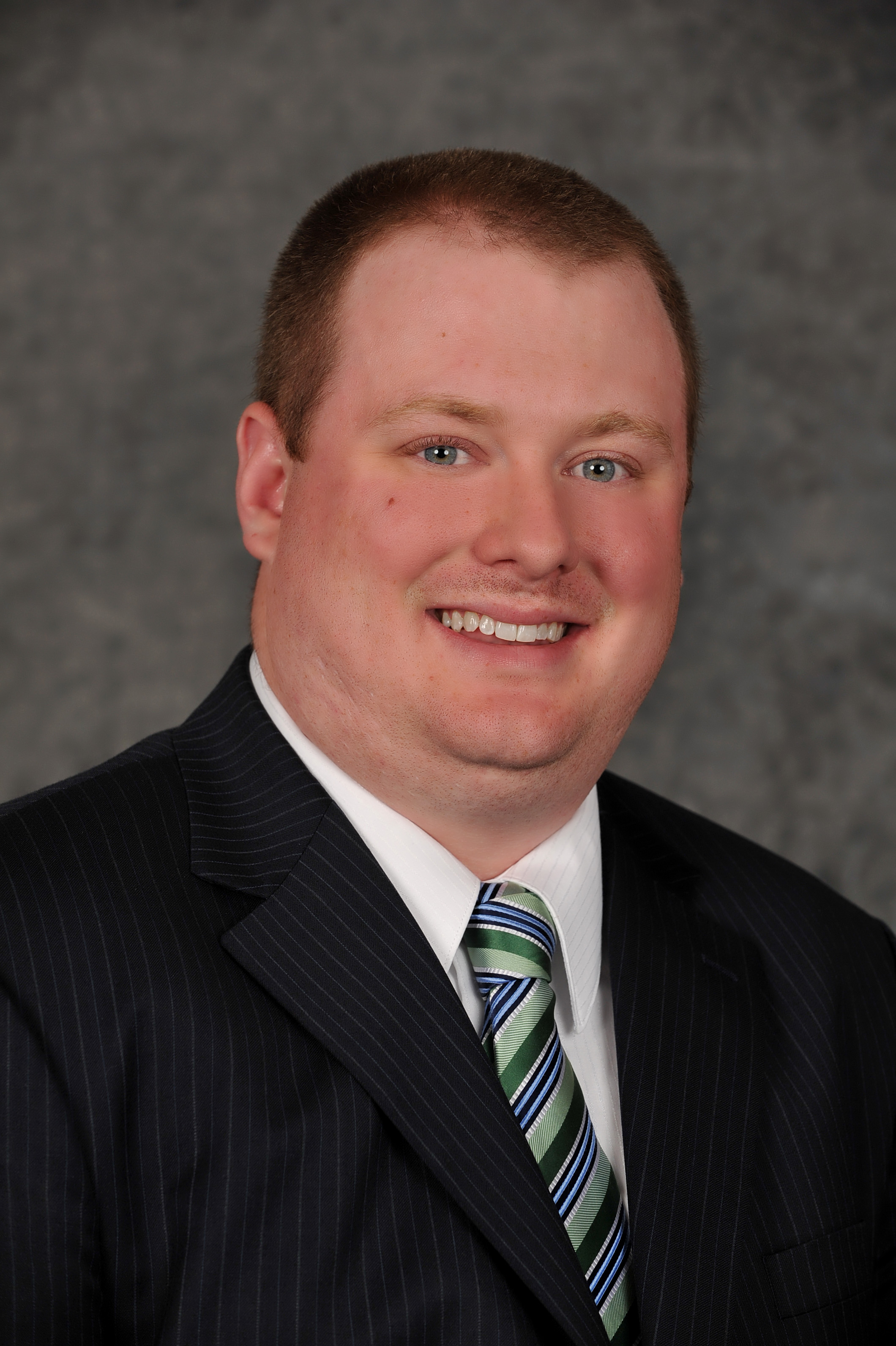
The recent FPPC regulation does not change the registration
threshold for contract lobbyists. However, it shifts the
presumption for those whose contracts call for direct
communication with state officials.
In California, contract lobbying firms are required to
register upon receiving, or being entitled to receive,
$2,000 or more in compensation in a calendar month...
Click here to read the full article
You must have a subscription
to
www.stateandfed.com
and be logged on!
Click here for subscription information
Shamus R. Williams,
Compliance
Associate |
|
|

|
|
 |
|

State and Federal
Communications, Inc.
Celebrates Employee
Anniversaries
|
|
 |
|
|
Each month at our staff
meeting, Elizabeth acknowledges the employment
anniversaries of the staff.
In November we celebrated
James Warner, Esq., Sr. Compliance Associate as
he reached eight years of service.
|
State and Federal
Communications, Inc.
Scrapbook -
November 2016 |
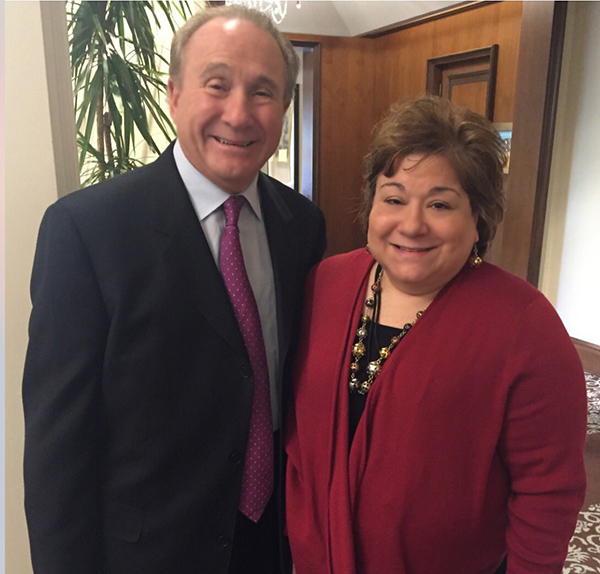 |
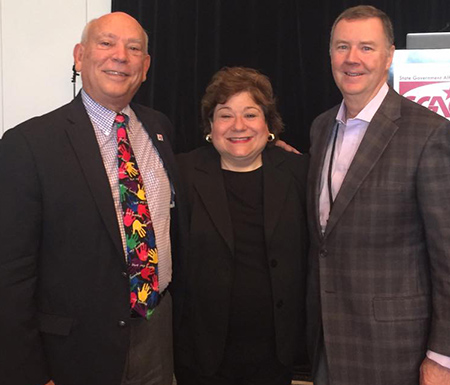 |
2016 SGAC LPC
Michael Reagan, guest speaker
visiting with Elizabeth Z. Bartz. |
2016 SGAC LPC
Ted Celeste, Elizabeth Z. Bartz,
and Christopher Badgley. |
|
|


Plan to say hello at future
events where State and Federal
Communications, Inc.
will be attending and/or
speaking regarding compliance issues. |
|
Events
|
December 2 |
Advocacy Leaders Network -
Benchmarking, Training, & Next-Level
Advocacy, Washington, DC |
|
December 6-9 |
NCSL Capitol Forum,
Washington, DC |
|
December 7 |
Ohio Holiday Reception,
Washington, DC |
|
December 7 |
WGR Holiday Party,
Washington, DC |
|
December 11-14 |
COGEL Conference,
New Orleans, Louisiana |
|
|
COMPLIANCE
NOW is published for our customers and friends.
Click here
to
SUBSCRIBE
or
click
here to UNSUBSCRIBE.
Click here to send us comments regarding
the COMPLIANCE NOW e-newsletter.
State and
Federal Communications, Inc. | Courtyard Square | 80 South
Summit St., Suite 100 | Akron, OH 44308 |
| 330-761-9960 |
330-761-9965-fax | 888-4-LAW-NOW|
http://www.stateandfed.com/

|
 |
The Mission of State
and Federal Communications is
to make sure that your
organization can say, "I Comply."
We are the leading
authority and exclusive information source
on
legislation and regulations surrounding campaign finance
and political contributions; state, federal, and
municipal lobbying; and procurement lobbying.
Contact us to learn how
conveniently our services will allow you to say "I
Comply" for your compliance activities.
http://www.stateandfed.com
|
www.stateandfed.com |
|
![]() View Full Print-Friendly Version
View Full Print-Friendly Version